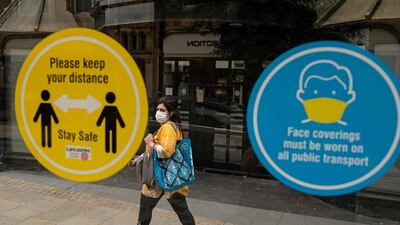Britain’s chief medical officers have raised the country's official coronavirus alert level, an indicator that the virus is in general circulation and the transmission is high.
The chief medical officers of England, Scotland, Wales and Northern Ireland say cases are rising “rapidly and probably exponentially”. They say they acted on the advice of the Joint Biosecurity Centre in raising the alert level from three to four, the second-highest level.
British Prime Minister Boris Johnson is expected to announce further coronavirus restrictions on Tuesday to slow the spread of the virus.
Earlier, Britain’s top medical advisers warned the public that they must make further sacrifices to control the second wave of the pandemic, saying new coronavirus infections could increase tenfold to almost 50,000 a day next month if nothing is done now to stem the tide.
This could cause more than 200 deaths a day by the mid-November.
Health workers are preparing for a second spike in line with sharp rises in other European countries, and 3,105 new cases were reported in the UK on September 15.
“We have, in a bad sense, literally turned a corner,” England’s chief medical officer, Professor Chris Whitty, said.
Mr Johnson was hunkered down with advisers and scientific experts at the weekend discussing measures to curb the surge in cases.
His Cabinet is said to be split, with some MPs, including Finance Minister Rishi Sunak, said to be opposed to a national lockdown because of the impact it would have on the economy.
Ministers said schools will be among the last institutions to be closed under potential new enforcement measures.
The government’s senior health experts said no areas of the country were unaffected despite efforts to tackle outbreaks with regional restrictions.
More than 10 million of the UK’s 67 million inhabitants are already in some form of local lockdown. More curbs will come into effect on Tuesday in Lancashire, Merseyside, parts of the Midlands and West Yorkshire.
But Patrick Vallance, the chief scientific adviser, said fewer than eight per cent of the population had developed antibodies, giving some protection against the virus. The figure could be higher in London, about 17 per cent, he said.
Experts said the numbers were too small to foster herd immunity.
The UK heads into the critical autumn season, when the cooler climate could help the virus spread more easily.
Prof Whitty said there was no evidence that the second wave of the virus was milder than the first. Experts said the second wave of the 1918-19 Spanish flu pandemic was deadlier than the initial outbreak.
“This isn’t someone else’s problem – this is all of our problems,” Prof Whitty said. “We should see this as a six-month problem we have to deal with ... we have to take this collectively very seriously.”

Sars-CoV-2 has killed more than 41,000 people in Britain since March. New cases dropped rapidly owing to an unprecedented three-month national lockdown but increased once more as the economy, schools and offices reopened.
The government has been heavily criticised for a shortage of tests, which has severely hampered the ability to track the outbreak and prevent its spread.
A national address by Mr Johnson later in the week is likely to be overshadowed by the warnings of Prof Whitty and Mr Vallance. On Sunday, Health Minister Matt Hancock refused to rule out another national lockdown but said that if people followed the rules it would not be necessary.
The government has also outlined plans for significant fines for breaches of safety rules. People in England who refuse to follow an order to self-isolate can now be fined up to £10,000 (Dh47,250).
Attempts to avoid a new national lockdown include plans for a "circuit break" that would cut social contact but keep schools and parts of the economy open. Professor Paul Hunter of the University of East Anglia said such a move would only delay a second wave.
The new warning comes amid signs of splits with the ruling Conservative party. Senior MP Graham Brady told the BBC the government had “got into the habit of ruling by decree” and demanded greater consultation with politicians before introducing new measures.
Transport Secretary Grant Shapps countered, telling the BBC the government had been forced to move at an exceptional pace because of the unique circumstances of the pandemic.

















